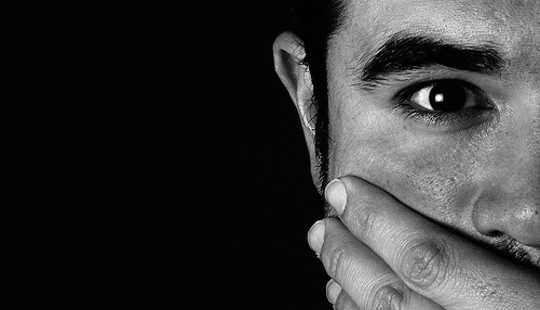
Many adults have a history of childhood abuse. The mistreatment may have been so devastating that they never fully recovered from the trauma. I have seen people work on their "inner child of the past" for many years. Even after years of therapy and meditation the fear and rage can still continue. In the words of one meditation teacher who was abused as a child, "It never goes away completely."
As harmful as these early experiences can be to our psyche, an accompanying form of abuse frequently compounds them. This is the abuse we give ourselves. This form is even more widespread and affects most of us in one way or another. What others have done to us in the past shapes our self-dislike and unworthiness.
We add to the enormous sorrow of our childhood, with the lack of compassion for ourselves. Our childhood experiences were time bound; we carry the inner abuser around with us continually. We sometimes hold ourselves accountable for circumstances beyond our control and then abuse ourselves for years over the outcome.
Our hospice grief support group opens its services to the community at large. One evening a man who had not been served by hospice joined the first group session. During the initial meeting each participant shared his or her individual story of grief. This person said that his wife had died five years earlier of Alzheimer's disease. They had been married over fifty years. Before she became ill, the couple had pledged to each other that neither one would ever place the other in a nursing home. Soon after that vow his wife started to deteriorate mentally. She could no longer recognize her family, and she would wander away from home and not be able to find her way back. At one point she left the gas burner of the stove on and came close to burning down the house. The couple's grown children and the family physician all encouraged the husband to place his wife in a nursing home. Reluctantly, he conceded and placed her in the nicest home he could find. She died two weeks after moving to the home.
At this point in his story the man was crying uncontrollably. He said that he had not lived a single day in the last five years free from the guilt of breaking his vow to his wife. The other people in the group all supported what he had done. One woman suggested the man forgive himself for making the promise in the first place rather than feeling guilty for the action which broke the promise. The man refused to listen to any of their advice and said, "I must live with the guilt of my broken promise for the rest of my life."
Holding Ourselves Hostage To The Past
We seem to have an unlimited ability to hold ourselves hostage to the past. Since the past is fixed, it is unforgiving. It will not give us a second chance to act differently. Our past says that the harm we did is irreparable. We are prisoners of actions we cannot change. But our perspective of the events can change even though the events themselves cannot.
Guilt arises when we maintain a fixed self-image from past to present. In guilt there is no room for self-improvement or growth, but plenty for self-condemnation. We did something unskillful yesterday or last year, and we blame ourselves today for those past actions. But things are not the same now. We might respond very differently if the same situation occurred today. Why do we linger in guilt about the person we used to be? That person has died, and, by letting go of that image and allowing ourselves to be who we are today, we can experience forgiveness.
The Past Cannot Be Changed
The way to understand guilt is not to ignore or repress it but to open it up beyond its content and relationship to time. Since our past actions cannot be changed, to dwell again and again on what we did wrong keeps us imprisoned within immutable time. Struggling in this way only reinforces our bondage. It is another form of self-abuse.
Imperfect actions are an indication of our humanness. Very few actions we take are totally pure in attitude and response. To acknowledge that as a human being most of our responses are incomplete and partial is to admit that our growth is unfinished. We have been placed on this earth to grow in an open-ended way, not to be pure.
When we are forgiving, we attempt to forgive those who wrong us for the specific harm they have caused. But incidents of wrongdoing can never be made right. Forgiveness cannot come by addressing a particular incident alone. It can only come by forgiving the character of the person who did the wrong. The character is the sum total of all the person's behavior. We forgive persons for being who they are. We forgive them for not being totally reliable human beings. Such forgiveness is possible only when we have accepted our own character flaws.
We Create Our Own Hell In Our Mind
In Jean Paul Sartre's play No Exit, three dead people find themselves in hell. This hell is not the torturous physical environment often depicted in theologies but the unforgiving attitude of the inhabitants toward one another. These three people cannot tolerate one another but can find no way out of the others' company.
The story demonstrates how we each create a hell within the mind. We need no help from an angry and unforgiving deity. The hell we create on earth for one another is a symptom of the private hells we create when we are unable to allow for any transgressions.
We are usually unable to forgive ourselves and allow ourselves to be fallible human beings. Because of this harshness, we are not good at forgiving others. We have little room in our hearts for self-acceptance, much less for forgiveness of others. The more we pressure ourselves with our morality, the greater our self-condemnation. When we define ourselves as being on a path of purification, we create a shadow that expects us to be superhuman. The results are shame, guilt, and an unforgiving mind.
Religious Morality Cannot Help Us
Religious morality cannot help us forgive because it imposes an idea of forgiveness that does not come from the heart. "I forgive you because God expects that of me." We attempt to live up to God's standards of tolerance. Such gestures do not come from an open heart but from a prescribed ethical standard.
Forgiveness can only arise out of deep humanity. Forgiveness was never divine. It has always arisen from the innocence of heart which gives permission to be fallible.
One of the distressing events in my early adulthood was the death of my mother. I was going to school in Ohio and my parents were living in Georgia. Occasionally I would fly down to Georgia to visit them on holidays and weekends. On one trip my mother was very ill and had a temperature of over 102 degrees for two weeks. She had seen the doctor a week earlier, and he had diagnosed her illness as influenza.
After the second week of this high fever my mother thought that the illness might be more serious than originally diagnosed, and asked me to call the doctor and report that the fever was continuing. My relationship with my mother at that point in time was strained, and I told her that the doctor had already diagnosed her with the flu, and I did not want to bother him again. She asked me to call him once more, and I reluctantly agreed. When I called him, I phrased the problem as my mother's heightened concern, and said that if he would simply tell her again she had the flu, she would accept it and relax. The doctor told me to tell her it was the flu. I relayed this back to my mother, and she did become more relaxed about her fever.
My trip came to an end and I returned home. Two days after I got back I received a call from my brother. My mother had died of pneumonia.
Allowing Ourselves To Make Mistakes and Learn From Them
How was I to live with that death? That action would burn in me for years, and I condemned myself cruelly while trying to atone for it in many ways. After years of trying to right the wrong, I saw this could never be done. Self-forgiveness would never come from rationalizing my action or blaming the doctor. It could only come from the wisdom of time, from watching my actions, knowing my intentions, and seeing the incomplete results. Having high ideals just seemed to cause more inward conflict. Since I could never live up to my expectations of myself, there was nothing left to do but allow myself to make mistakes and learn from them all along the way.
I found I became more accepting of my mistakes when my intention was to learn from them. I saw I usually did the best I could, given the circumstances -- my mood, my confused relationships with others, my past history. Out of all of that I would act, and often the action was incomplete. What more could I do but attempt to learn and begin again.
We all do the best we can. When we see this in others, our hearts open. When we see it in ourselves, we can begin to forgive. True, our actions are often incomplete and hurtful. We may be lost in a selfish state of mind, but often that is all the clarity our minds will allow. Because of our limited understanding in that moment, there is no other way we can act. But realizing this is only the beginning of the process of self-knowledge.
Over time we begin to view ourselves with a little more compassion. We start by being tolerant. For many people this is difficult to do, so we develop tolerance for our intolerance. We own our prejudice. Saying, "I should not be like this," simply conditions more intolerance in our minds. Instead we might open to our mind's darkest corners, allowing the shadow to come into the light of our attention. Awareness of our states of mind is the light that heals. Awareness is its own protection from acting irresponsibly.
Oh, That's Just The Way I Am
To excuse our behavior by saying, "Oh, that's just the way I am", is to dismiss our responsibility for being the way we are. It is a deflection away from who we are by providing an excuse and a rationale for what we do. When we fully accept who we are, we do not need an excuse; everything we do is totally acknowledged and owned. We live with ourselves just the way we are, intensely studying our reactions and responses. We honor ourselves as growing human beings and take responsibility for acting according to that humanity.
Being natural also includes holding ourselves and others accountable for inappropriate behavior. Many of the behaviors that we have endured cannot be easily forgiven. We take responsibility for our lack of forgiveness and hold others accountable for their actions. This could take the form of either confronting or avoiding the person altogether. But our actions are based on being a responsible human being and not on a prescribed reaction. Forgiveness is possible only when we take full responsibility without deflecting the blame or rationalizing our behavior.
Being natural is open-ended forgiveness. It is living a life as a human being without internal contradiction. It is both being simple and simply being who we are without pretension or exaggeration. We own our mistakes without condemnation because we are interested in self-growth, not self-abuse. Forgiveness flows easily from ourselves to other people because our hearts are not involved in any internal conflict.
Reprinted with permission of the publisher,
Wisdom Publications, Boston. ©1998.
http://www.wisdompubs.org
Article Source
Lessons from the Dying
by Rodney Smith.
 In everyday language we can all understand, Rodney Smith extends the conversation about death to people of all ages and states of health. Through exercises and guided meditative reflections at the end of each chapter, the lessons of the dying become a blueprint for our own growth.
In everyday language we can all understand, Rodney Smith extends the conversation about death to people of all ages and states of health. Through exercises and guided meditative reflections at the end of each chapter, the lessons of the dying become a blueprint for our own growth.
For info or to order this book. (new edition, new cover). Also available in a Kindle edition.
About The Author
 RODNEY SMITH spent eight years in intensive retreat both at the Insight Meditation Society in Massachusetts and as a Buddhist monk in Asia. Since disrobing as a monk in 1983, he has worked as a hospice social worker, bereavement coordinator, program director, and executive director. At the end of 2016, Rodney retired from a full-time teaching role after more than 30 years of teaching. He served as a Senior Teacher for the Insight Meditation Society (IMS) and the founding and guiding teacher of Seattle Insight Meditation. He is author of the books Lessons From the Dying, Stepping Out of Self-Deception: The Buddha's Liberating Teaching of No-Self, and Awakening: A Paradigm Shift of the Heart. For more information, go to http://www.seattleinsight.org/
RODNEY SMITH spent eight years in intensive retreat both at the Insight Meditation Society in Massachusetts and as a Buddhist monk in Asia. Since disrobing as a monk in 1983, he has worked as a hospice social worker, bereavement coordinator, program director, and executive director. At the end of 2016, Rodney retired from a full-time teaching role after more than 30 years of teaching. He served as a Senior Teacher for the Insight Meditation Society (IMS) and the founding and guiding teacher of Seattle Insight Meditation. He is author of the books Lessons From the Dying, Stepping Out of Self-Deception: The Buddha's Liberating Teaching of No-Self, and Awakening: A Paradigm Shift of the Heart. For more information, go to http://www.seattleinsight.org/
Video with Rodney Smith: Freedom from the Worry Mind
{vembed Y=JHWD87LkufA}
Related Books
Books by this Author
at InnerSelf Market and Amazon

























